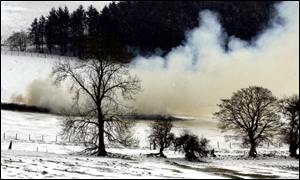
A farmers’ union leader has urged the instant culling of all animals on farms suspected of having foot-and-mouth if a positive case is identified nearby.
Bob Parry, president of the Farmers Union of Wales, told BBC Wales test results on farms were taking too long to come through – six days in some cases.
The only solution, he said, was that livestock on any suspect farm which was near a positive case should be slaughtered – even if the farm eventually proved to be free of the virus.
“I’m very, very worried,” he said.
“It’s quite apparent now that something has got to be done quickly.
“I believe we should go back to the policy that was used in 1967 and before that, and that was that if there was a positive case, then all suspected cases in the immediate vicinity were destroyed straightway.”
Ministry of Agriculture officials have revealed there are 15 suspected cases of foot-and-mouth in Wales – 10 of them near the abattoir in Anglesey where the disease was confirmed earlier this week.
The are still only three confirmed cases in Wales. As well as the plant at Gaerwen on Anglesey, cases have been identified at a farm in Painscastle near Hay-on-Wye, and at a farm in Knighton in Powys.
But on Saturday, Ministry of Agriculture vets said they were investigating nine potential new cases near to the Gaerwen abattoir in Anglesey, and tests were also taking place at a farm in Painscastle near the confirmed outbreak.
A tenth suspect case at Gaerwen was reported on Sunday.
Investigations were also being carried out in Montgomeryshire, Monmouthshire, Radnorshire, and Torfaen in south-east Wales.
Mr Parry warned that if, something was not done in Anglesey soon, “we could see the whole of Anglesey being an infected area by next weekend, and probably thousands of animals being destroyed.”
The news comes after the government announced measures to ease the ban on the movement of livestock to help reduce economic hardship to farmers hit by the crisis.
The burning of 7,500 sheep and cattle carcasses in Anglesey began on Saturday, following the destruction of 750 in mid Wales on Friday.
Across the UK, 53,000 animals have now been slaughtered.
Meanwhile, farmers whose stocks are unaffected have begun applying for licences to move animals direct to abattoirs.
The first movements of animals are expected to take place early next week.
Farmers are to be granted licences to help ensure the transportation of animals is carried out safely.
Speaking in Cardiff, Tony Blair said the move would bring a “considerable amount of respite” for farmers.
He said the ban on animal movements had prevented the current outbreak from spreading in the same way as the disease did in 1967.
And he insisted that the licensed slaughter scheme was “enormously important”.
“Obviously there will be a limit to what we can do because they will have to be licensed under very strict conditions but it will mean that at least some British meat is going back into the food chain and that’s enormously important.”
The total number of cases around the UK now stands at 43 – including new cases confirmed in Cornwall, Scotland, and Durham on Saturday.
Butchers throughout Wales have reported that stocks of red meat are running low.
Some supermarkets have already run out of pork and lamb, and some have said they will buy in meat from abroad to replenish stocks.
John Morgan, whose family has had a butcher’s stall in Cardiff market since 1861, has said that people were buying more than they needed.
“Customers are buying much more than they usually have, and we are running out,” he said.
“Our problem is that we can’t replace our stocks”.
But as details of the relaxation of livestock movement is expected, police in Wales are still warning that they will prosecute those found moving livestock illegally after animals were found to have been moved in three separate locations.
There had been fears that with the lambing season due to start, many Welsh farmers may be considering breaking the law.
All movements of animals have been banned since Friday 23 February under emergency legislation and police have said that anyone found livestock faces fines of up to £5,000.
Daily broadcasts informing farmers of developments and offering guidance are to be broadcast from Friday on BBC Radio Cymru (0715GMT and 0805GMT) and Radio Wales (0620GMT).
Welsh Assembly emergency helplines : 029 20825572 029 20825578 029 20825586